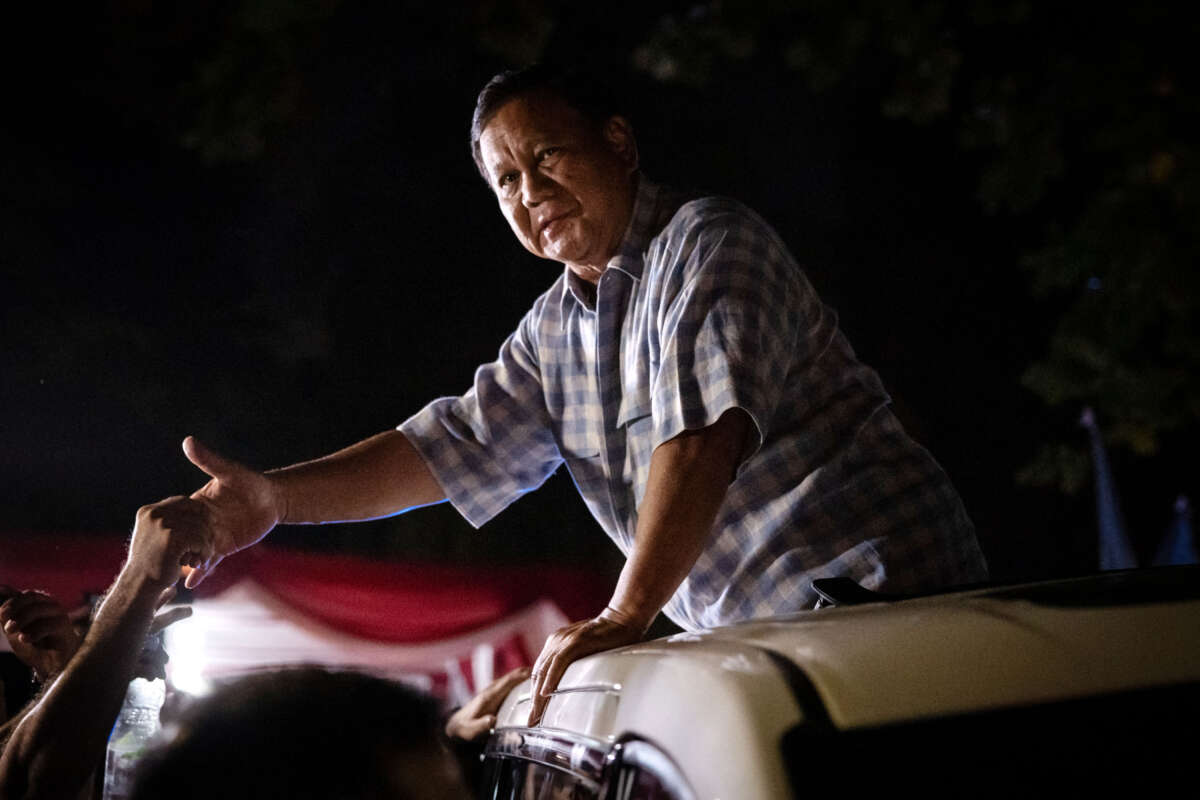Indonesian Defense Minister Prabowo Subianto — a former U.S.-trained general in an army unit implicated in genocidal violence — declared victory Wednesday after polls closed in the archipelago nation’s presidential election, although no winner has officially been announced.
Unofficial results showed Prabowo, of the right-wing populist Gerindra party, with nearly 60% of the vote. His two rivals — former Jakarta Gov. Anies Baswedan of the Coalition of Change for Unity and Ganjar Pranowo of the Indonesian Democratic Party of Struggle (PDI-P) — have not yet conceded defeat. In order to avert a runoff, Prabowo needs more than 50% of all votes and at least 20% in each of the nation’s 38 provinces.
“We should not be arrogant. We should not be proud. We should not be euphoric. We still have to be humble,” Prabowo told jubilant supporters in a packed Jakarta stadium Wednesday. “This victory must be a victory for all Indonesian people.”
U.S. journalist Allan Nairn explained in a Tuesday interview with Democracy Now! how Prabowo ran a “two-pronged” campaign that involved “pressuring and coercing the poor with threats to their well-being” as well as a “PR campaign that portrays the general as a cuddly cartoon character.”
Nairn added that “none of it would be possible” without the support of popular incumbent PDI-P President Joko Widodo, whose son Gibran Rakabuming Raka is Prabowo’s running mate.
In addition to concerns about potential democratic backsliding, critics noted Prabowo’s bloody past.
“Gen. Prabowo is the most notorious massacre general in Indonesia, and he’s also the general who was closest to the U.S. as he was carrying out his mass killings, abductions of activists, and systematic tortures,” said Nairn. “He was also the son-in-law of the former dictator of Indonesia, Gen. Suharto.”
As Indonesia votes for president this week, investigative journalist @AllanNairn14 details how "the state apparatus is being put behind" Prabowo Subianto, a notorious general with a history of leading massacres and coup attempts. pic.twitter.com/5UOlminGMt
— Democracy Now! (@democracynow) February 13, 2024
Prabowo, who trained at Fort Benning in Georgia, joined the elite Kopassus commando unit in 1976, shortly after then-U.S. President Gerald Ford and Secretary of State Henry Kissinger greenlighted the genocidal Indonesian invasion of East Timor after the former Portuguese colony declared independence.
Over the following two decades, around 200,000 people — approximately a quarter of East Timor’s population — were killed or died from starvation or disease.
“He is the general, most importantly, who led many of the massacres in East Timor after the Indonesian army invaded,” Nairn said of Prabowo. “In one case, in the village of Kraras, Prabowo and his forces killed hundreds of fleeing civilians. He later was involved in other massacres and directing assassinations of political activists in Aceh and West Papua.”
Nairn and Democracy Now! host Amy Goodman witnessed and survived a 1991 massacre of hundreds of East Timorese pro-independence demonstrators in Dili. Nairn was also briefly jailed by Indonesia’s military in 1999 and subsequently deported.
Prabowo also allegedly orchestrated the worst atrocity of the period immediately preceding Suharto’s 1998 fall from power. Kopassus troops under Prabowo’s command led the mass rape and murder of at least 160 Chinese-Indonesian women and girls — many of whom were reportedly burned to death after being sexually assaulted — and the slaughter of hundreds of other Indonesians of Chinese origin.
The Clinton administration cut ties with Kopassus in 1999 and banned Prabowo from entering the United States the following year. However, in 2010 the Obama administration, citing the unit’s improved human rights record under a democratic Indonesian government, resumed cooperation. This, despite reports that Kopassus was still committing atrocities against Christians in independence-minded West Papua.
In 2020, then-U.S. Defense Secretary Mike Esper invited Prabowo to the Pentagon as the Trump administration sought to bolster ties with Indonesia to counter the rise of China.
Our most important fundraising appeal of the year
December is the most critical time of year for Truthout, because our nonprofit news is funded almost entirely by individual donations from readers like you. So before you navigate away, we ask that you take just a second to support Truthout with a tax-deductible donation.
This year is a little different. We are up against a far-reaching, wide-scale attack on press freedom coming from the Trump administration. 2025 was a year of frightening censorship, news industry corporate consolidation, and worsening financial conditions for progressive nonprofits across the board.
We can only resist Trump’s agenda by cultivating a strong base of support. The right-wing mediasphere is funded comfortably by billionaire owners and venture capitalist philanthropists. At Truthout, we have you.
We’ve set an ambitious target for our year-end campaign — a goal of $205,000 to keep up our fight against authoritarianism in 2026. Please take a meaningful action in this fight: make a one-time or monthly donation to Truthout before December 31. If you have the means, please dig deep.
